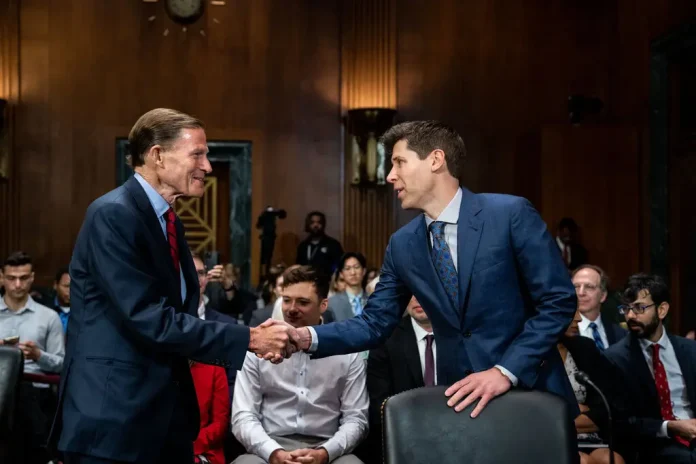Elon Musk, the head of several tech companies, addressed the significant risks of AI following a three-hour Senate hearing on artificial intelligence. Musk stated, “AI may have a low chance, but it’s not zero, to pose a threat to humanity.” He stressed the seriousness of AI mishandling and the potentially dire consequences. However, he also recognized the historical significance of the Senate meeting for the future of civilization.
Senate’s AI Hearing and Key Participants
Senate Majority Leader Chuck Schumer orchestrated this session, gathering high-profile tech CEOs, civil society leaders, and more than 60 senators. This marked the first of nine sessions aimed at achieving a consensus on AI regulation, as the Senate gears up to draft AI-related legislation. The meeting boasted the presence of Mark Zuckerberg (Meta), Sundar Pichai (Google), Sam Altman (OpenAI), Jensen Huang (Nvidia), and Arvind Krishna (IBM) among other influential figures. All participants expressed support for federal government oversight of AI, although the specifics remained elusive.
Balancing AI Benefits and Risks
Congress faces the challenge of balancing the advantages of AI with its potential societal risks. These risks encompass technology-based discrimination, threats to national security, and, as Musk warned, “civilizational risk.” Schumer underscored the imperative to maximize AI’s benefits while minimizing harm.
Diverse Perspectives and Priorities
The Senate hearing showcased a broad array of viewpoints. Labor unions voiced concerns over job displacement, while civil rights advocates emphasized the importance of an inclusive legislative process that empowers marginalized communities. While all attendees concurred on the need for AI oversight, there was limited discussion regarding the potential creation of a new federal agency for AI regulation. Some participants proposed assigning oversight responsibilities to existing agencies, including the National Institute of Standards and Technology.
AI Industry Priorities and Proposals
Tech industry leaders emphasized traditional priorities, advocating for increased federal investment in research and development, skilled immigration, and educational initiatives. Notably, companies like Google, IBM, Microsoft, and OpenAI have already proposed comprehensive oversight measures through white papers and blog posts. IBM’s CEO, Arvind Krishna, argued that AI regulation should target risky AI applications rather than just algorithms themselves.
Civil Society Concerns and Transparency
Civil society groups raised concerns about AI’s potential dangers, such as algorithmic discrimination and copyright violations. Some content producers, including CNN, The New York Times, and Disney, blocked AI models like ChatGPT from accessing their content due to these concerns. These groups stressed the imperative of a democratic and transparent legislative process.
Schumer’s Approach and Legislative Timeline
Schumer, alongside three other senators, leads the Senate’s approach to AI regulation. They aim for a deliberate and cautious approach, with the goal of crafting AI legislation over several months rather than years. While some AI-related bills have emerged in Congress, Schumer’s push represents a coordinated effort to shape AI legislation.
European Union’s Advancement
The European Union has taken a lead in AI regulation, with plans to finalize a comprehensive AI law by the year’s end. This law could limit AI’s use in predictive policing and other areas. U.S. lawmakers face the challenge of catching up with their European counterparts.
Criticisms and Alternative Proposals
Some senators, such as Richard Blumenthal and Josh Hawley, expressed skepticism about the Senate meeting’s effectiveness and presented their legislative framework for AI regulation. They called for the establishment of a new independent AI oversight body, licensing for AI development, and individuals’ ability to sue companies over AI-driven harms.
The Senate AI hearing brought together diverse perspectives from tech industry leaders, civil society groups, and lawmakers. While there is consensus on the need for AI oversight, the specifics of regulation and the role of a new federal agency remain uncertain. Schumer’s goal is to craft legislation that balances the benefits and risks of AI while considering societal impacts. The development of AI regulation in the U.S. is an evolving process with various challenges and perspectives to navigate.



